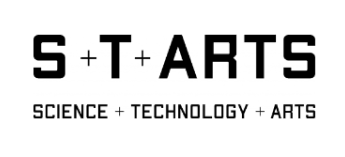Scenario 1: The Microbial Renaissance: A Culinary Tech Revolution
By Chloe Rutzerveld
#precision fermentation #trust #consumer acceptance #radical new foods #microbial-based food #food design
Here you can explore in detail the future scenario. Opportunities describe a potential for innovation that this scenario unfolds, considering specific technologies, context of application and industry. Scenario narrative gives a description of the scenario provided by the artist. You can also watch a Video to dive into the future world of the scenario, where the artist will guide you through. Trends of the scenario explore the current trends and developments on which the scenario is based. And finally Elements of the scenario provide artifacts, objects, personas and other elements from the future to immerse and discover the scenario.
OPPORTUNITIES
There are opportunities for companies specializing in food technology, biotechnology, and AI. They can spearhead the development of precision fermentation techniques, ushering in a new era where microorganisms serve as ‘cell factories’ to synthesize biologically identical ingredients, thus replacing traditional animal-based products and advancing food sustainability. Additionally, by harnessing digital production techniques, these companies can mold, flavor, and texture the harvested microbial-based ingredients, unleashing a realm of novel food products with diverse sensory experiences. Moreover, the integration of artificial intelligence tools empowers them to transcend the confines of human creativity, revolutionizing the design and development of microbial-based foods. However, beyond technological advancements, a cultural revolution is imperative, necessitating community engagement and enthusiasm for alternative approaches to food production, cooking, and social interactions. There are opportunities for companies working with novel foods to create strategies for increased consumer acceptance.
SCENARIO NARRATIVE
The Microbial Renaissance marks a transformative era in culinary practices and sustainable food innovation, with the culinary arts seamlessly transitioning to cutting-edge technology. The use of animal-based ingredients and the depletion of our natural resources have become outdated practices. What if we replace animal-based products with biologically identical ingredients synthesized directly by microorganisms, paving the way for a more sustainable world? Microbes, including bacteria, yeasts, fungi, and microalgae, can be used as ‘cell factories’. Scientists can ‘program’ these organisms to produce a specific protein, carbohydrate, fat, vitamin, or aroma in a growth tank. This is called precision fermentation. After harvesting the ingredients, they can take on any shape, flavor, and texture we want using digital production techniques. However, imagining interesting, novel food products that do not resemble existing products but still look edible is very difficult. By making smart use of artificial intelligence tools, we can go beyond the limitations of our own imagination and revolutionize the products we consume. But just adjusting our diet is not enough for this culinary transformation.
A cultural revolution is needed – one that involves the entire community and generates enthusiasm for an alternative approach to food production, cooking, eating, and social interactions around food.
In the age of the Microbial Renaissance, each moment becomes an exploration, every dish a creation, and every encounter a celebration of the boundless possibilities unlocked by the wondrous world of microbial-based foods.
VIDEO
TRENDS OF THE SCENARIO
Reimagening Protein – global development of alternative protein sources (PLANT BASED)
To reduce the carbon footprint of food production on the earth and end to animal suffering, many startups, scientists and established food producers around the world are working to develop alternative sources of protein. From plants, from cells or from micro-organisms.
Use of AI & Robotics in gastronomy
The culinary world is undergoing a revolution with the rise of AI and robotics. From dish inspiration to personalized service, these technological tools are increasingly integrated into restaurants, although still in their infancy. Expectations are that applications will further evolve in the future, providing an even more advanced culinary experience.
Increased interest in the symbiotic relationship with microbes to support overall mental, physical and planetary health
A heightened awareness of microbial life is transforming various sectors. From sustainable solutions like plastic degradation to advancements in gut health with microbiome exploration, there’s a growing recognition of the profound impact microbes have on our well-being and the environment. This increased awareness is driving innovations that leverage the symbiotic relationship between humans and microorganisms for a healthier, more sustainable future.
Creative storytelling and education for novel food acceptance
New food ingredients and products are scary and take time to be implemented in society. Communication and education for regular consumers in an early stage is very smart to ease the way. It’s interesting to see different ways of how companies working on novel food products try do start early and creatively with public engagement, education and communication through: celebrity endorsement, the use of characters or comparing historical events.
ELEMENTS OF THE FUTURE SCENARIO
High-tech Fermentation Labs
In high-tech fermentation labs, microbial-based ingredients are being produced. Next to being a production facility, it’s a place of research, analysis, training, citizen science education and wonder.
1A. Research section: Researching and creation of new microbial strains for food production through precision fermentation.

1B. Analyzing & tasting microbial-based novel foods: This high-tech analysis device allows scientists to analyze their latest microbial-based food creations. On nutritional values, safety, texture, taste and aroma before moving on to tasting.
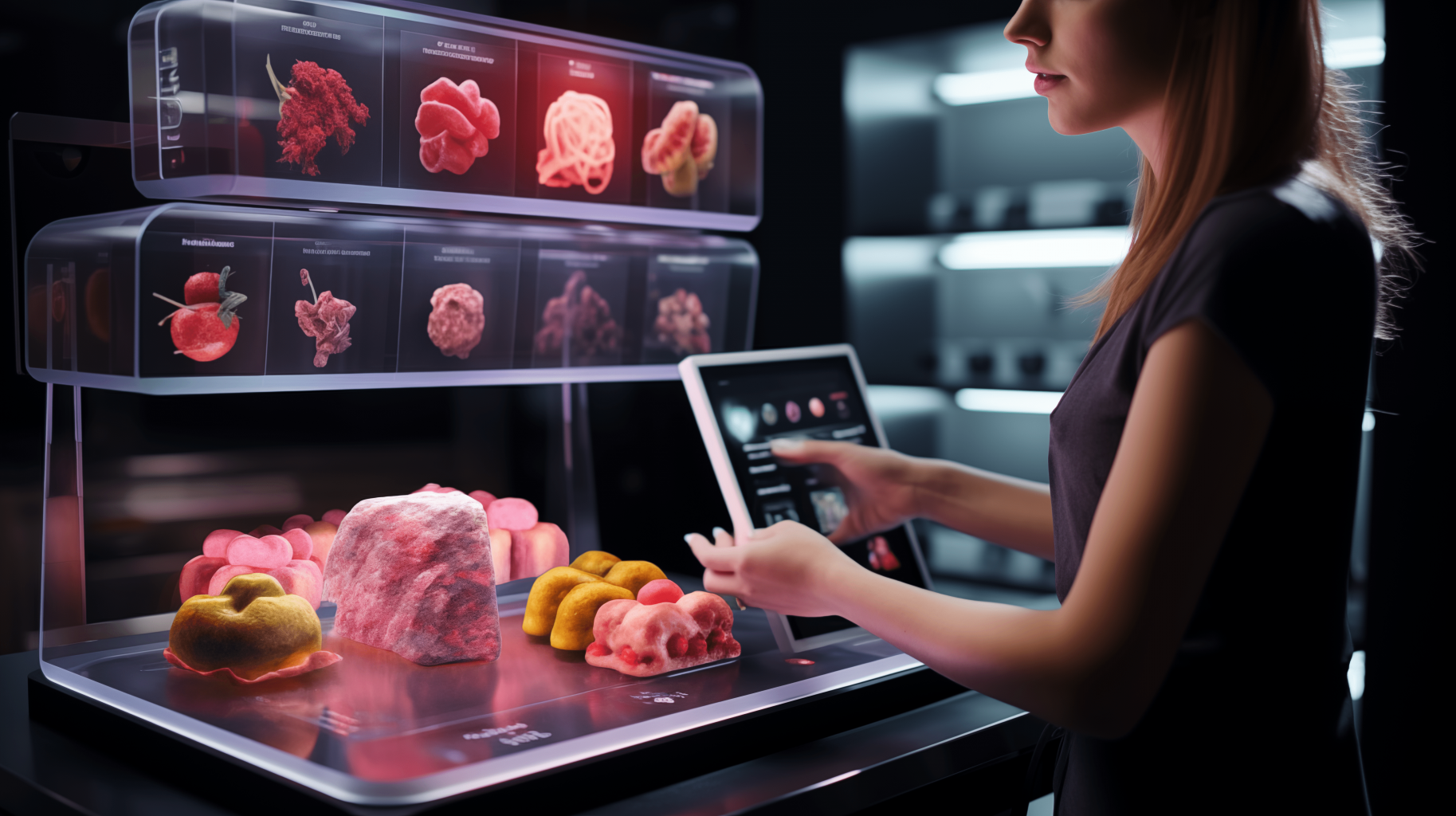
1C. Education & training section: In the education and training section of the high-tech fermentation facilities, both consumers and professionals are welcomed to ask questions and gain knowledge about microbial-based foods. In an interactive and visual way, visitors can gain insight into what microorganisms are, how they can be used to produce ingredients, and get inspiration on how to grow microbes themselves at home and cook with these new ingredients.
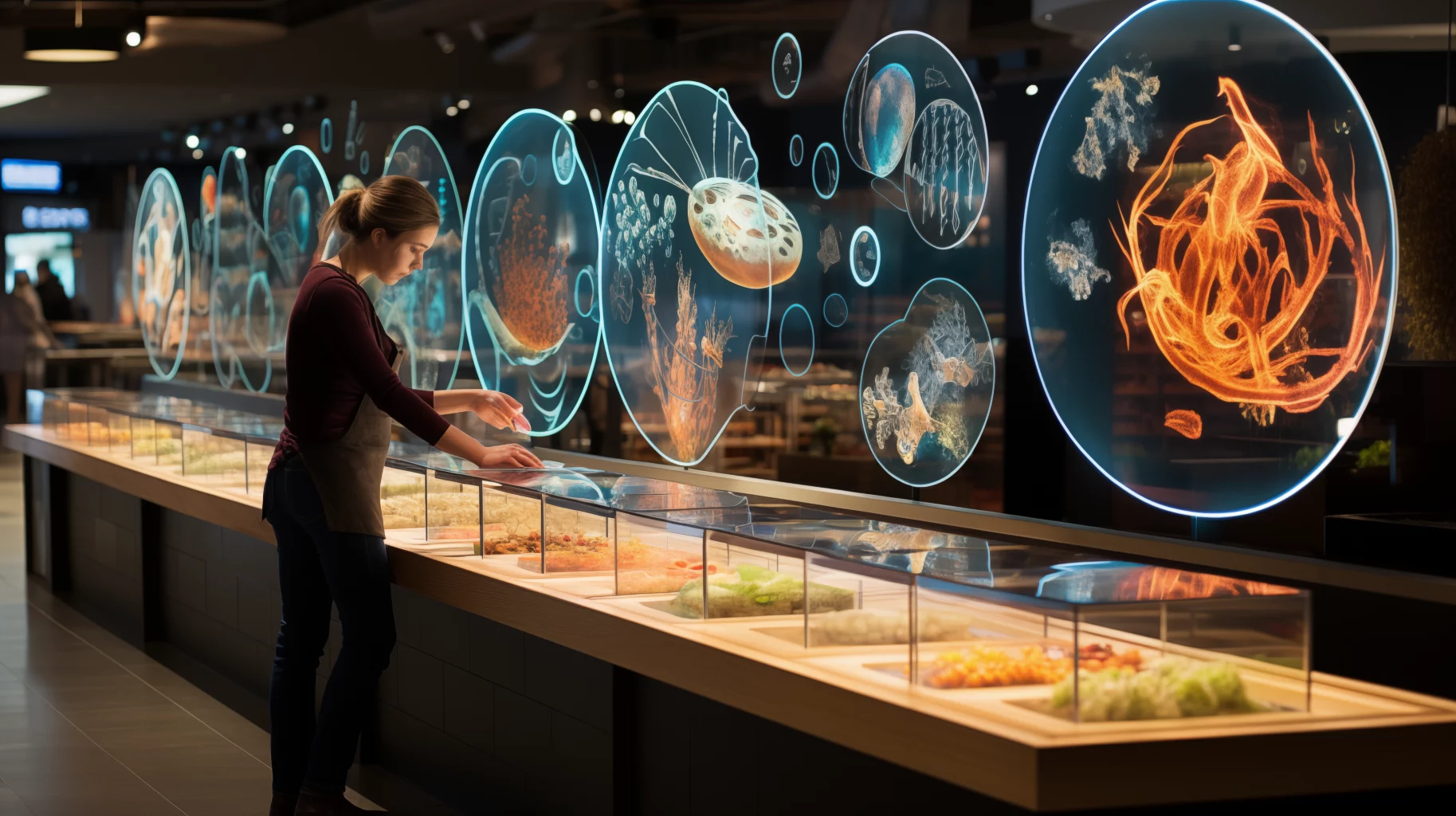
1D. Holographic microbial campaigns on the street: Holographic interactive displays with the latest microbial strains, decorate the streets. These artistic displays are part of a campaign to make the general public enthusiastic about the Microbial Renaissance and to discover the endless culinary possibilities of microbial-based foods.
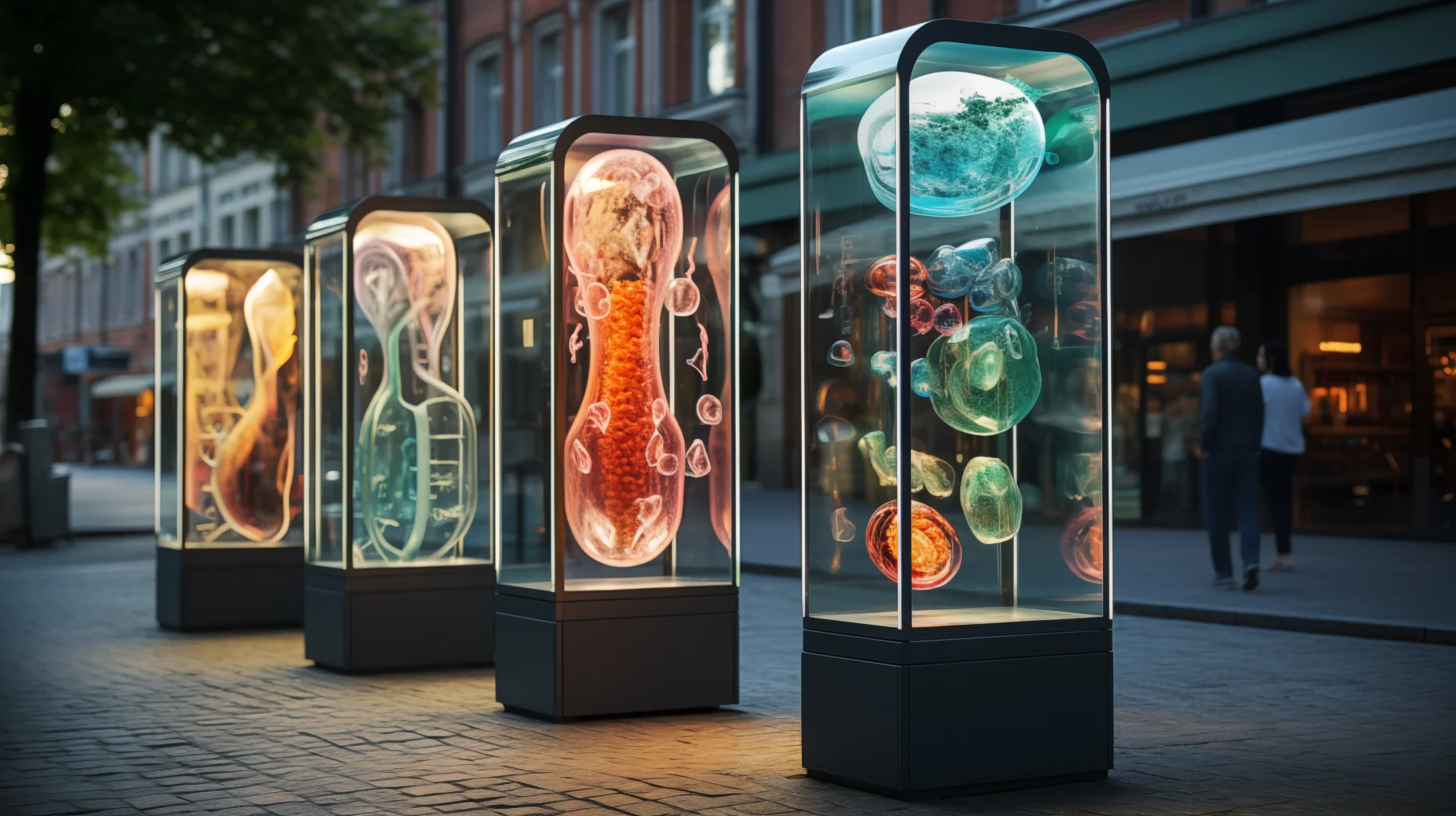
Transitionary Microbial Cafés
Transitionary microbial cafés blend familiar and innovative dishes in a vibrant setting. Delightful aromas waft through the air as visitors, from seasoned enthusiasts to newcomers, engage in lively conversations over uniquely crafted microbial-infused beverages and snacks.
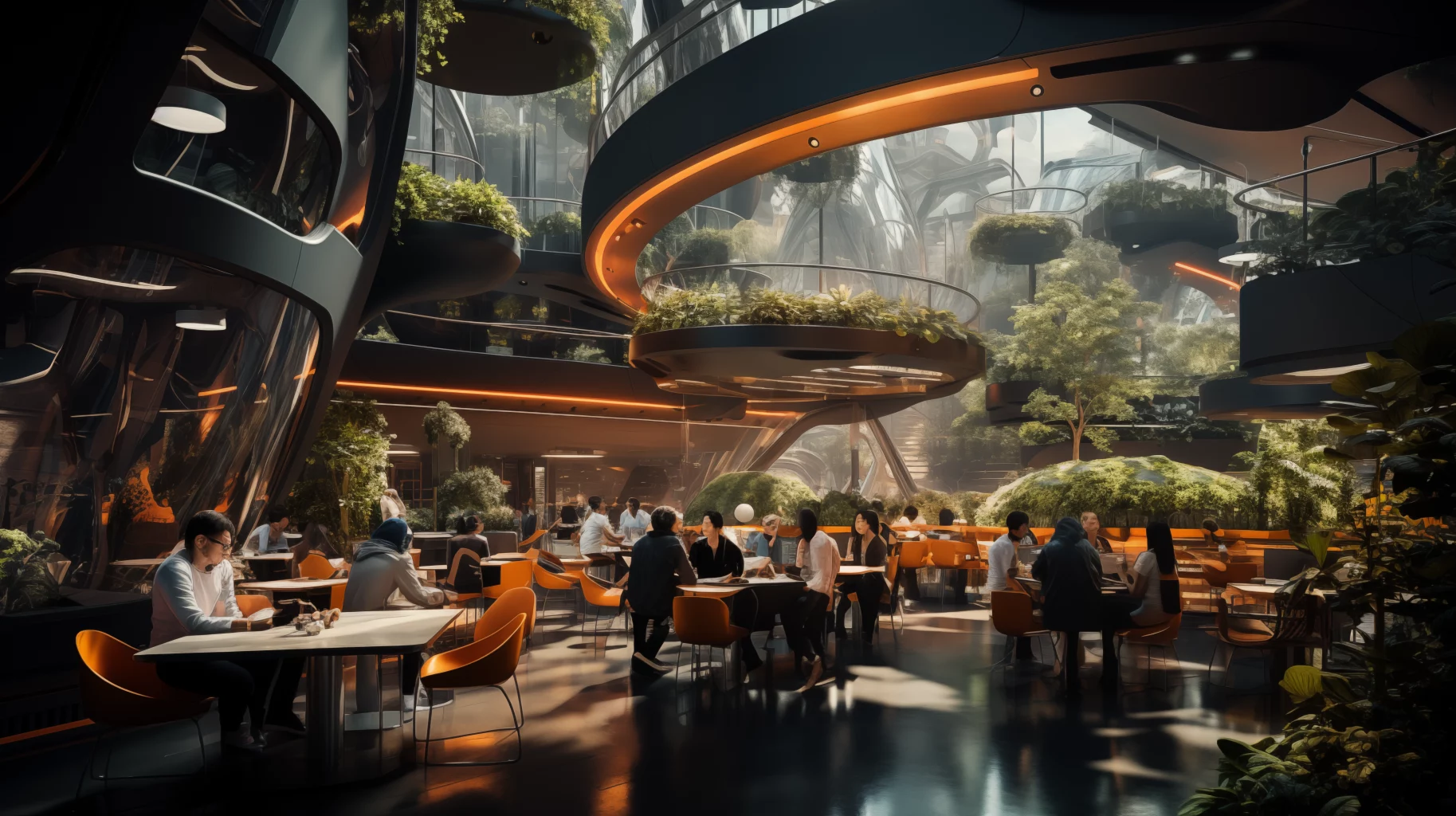
Microbial Synthesizer
The Microbial Synthesizer is an advanced kitchen appliance that seamlessly integrates technology and culinary innovation. With a sleek design and a transparent chamber, it enables users to synthesize and customize microbial-based ingredients. Users can choose from a global catalog of pre-programmed strains or design custom combinations. The synthesizer employs precision fermentation techniques, allowing users to observe the microbial cultivation process in real-time. Once the synthesis is complete, the freshly harvested microbial ingredients can be instantly incorporated into culinary creations, potentially with additional features like integrated cooking or a 3D printer for futuristic meals.
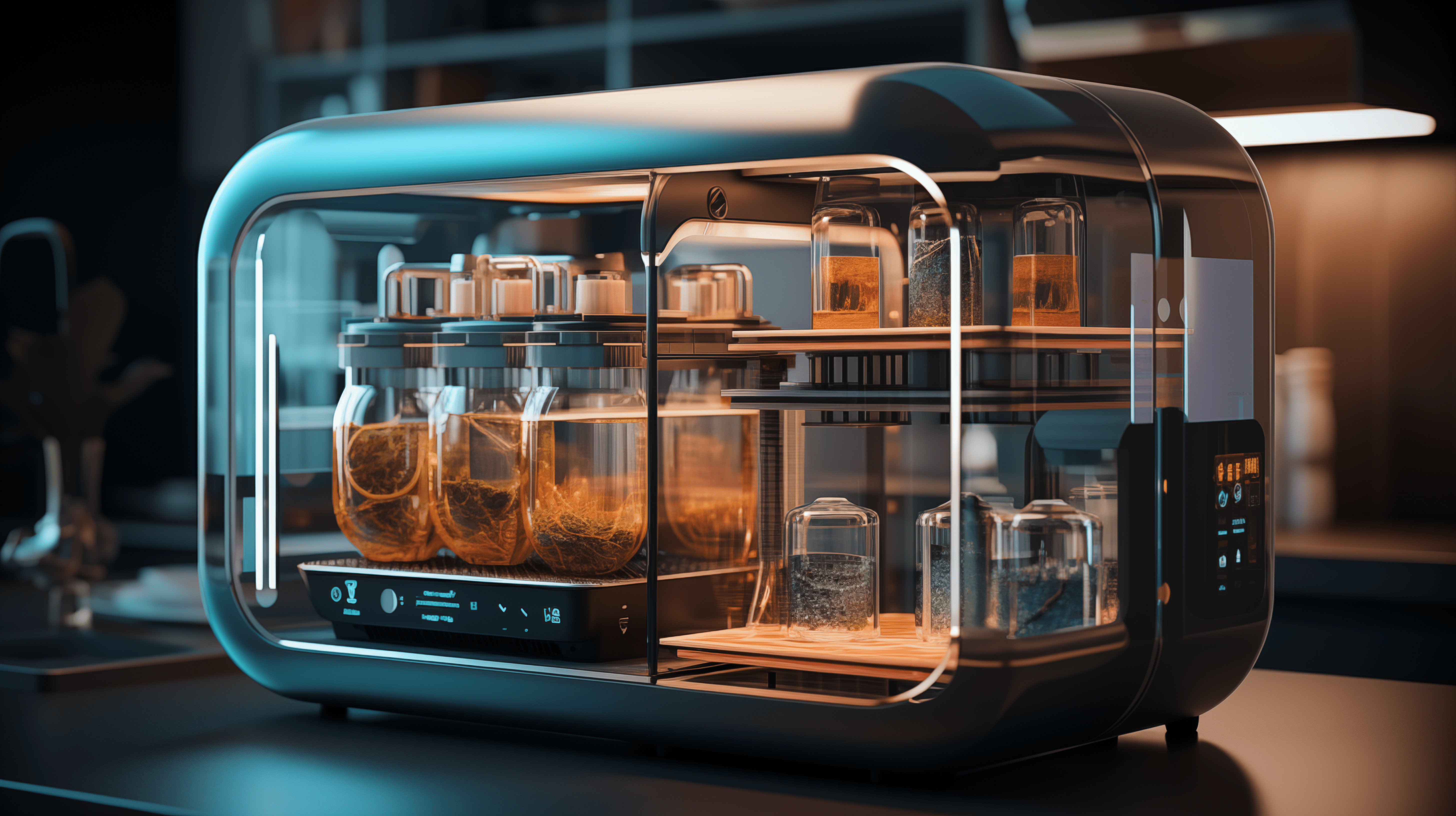
The Microbial Sanctuary
The Microbial Sanctuary serves as a specialized facility devoted to preserving and safeguarding rare and endangered microbial strains crucial for maintaining biodiversity in microbial-based food production. This sanctuary houses unique cultures vital for ecological balance and the development of resilient microbial communities. Access to this facility is restricted to prevent contamination, unauthorized experimentation, or accidental mishandling that could jeopardize the delicate ecosystems within the sanctuary. The preservation of these microbial strains is considered paramount for the stability and diversity of the microbial-based food system, making the Microbial Sanctuary a crucial hub for the protection and cultivation of microbial biodiversity.
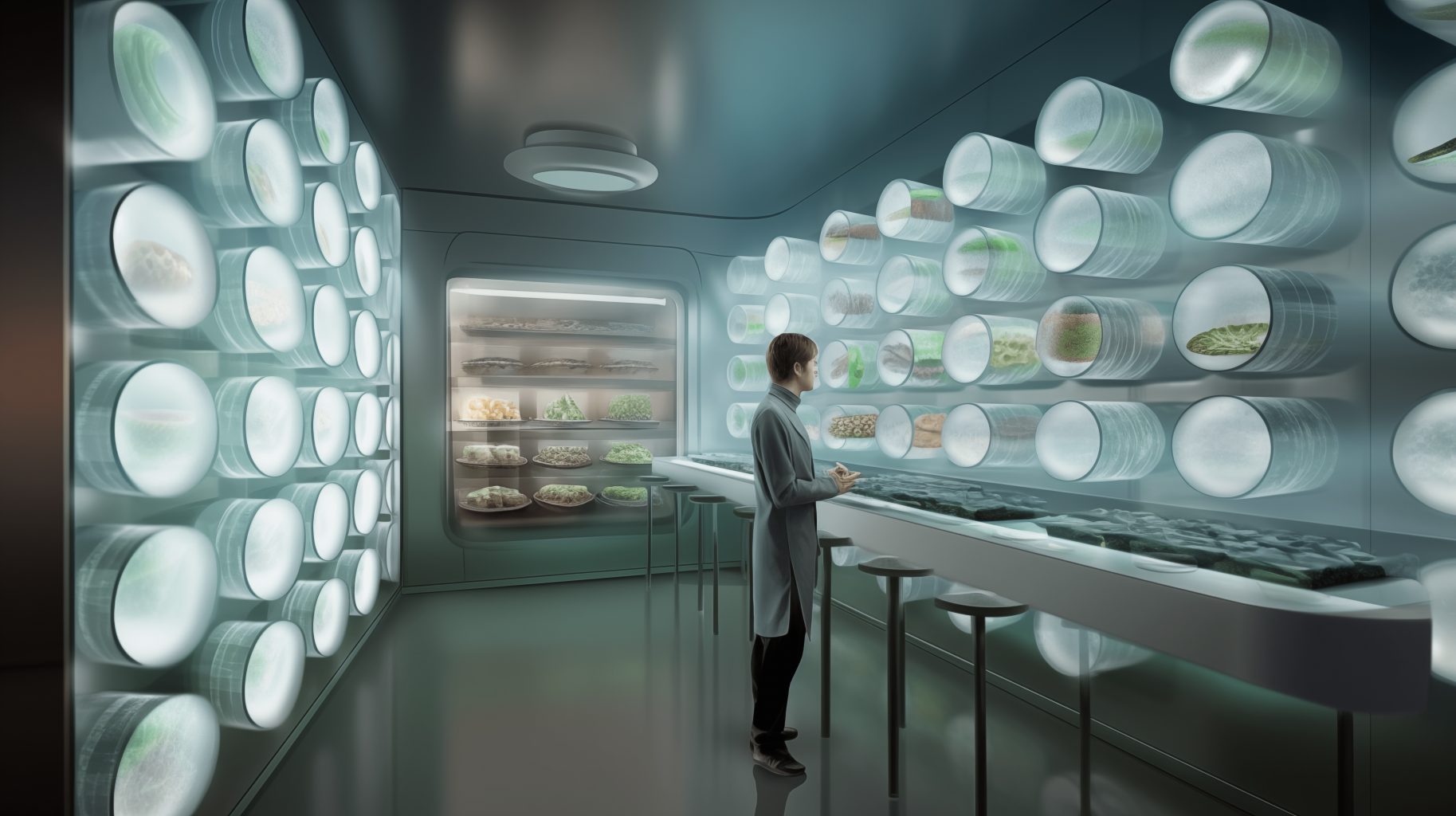
Personas
The Cautious Connoisseur – Omar (43)
A middle-aged professional who appreciates new cuisines but remains cautious about fully adopting microbial-based foods. Omar feels comfortable visiting transitionary microbial cafés to gradually explore microbial alternatives while maintaining a balance with familiar dishes. He is open to trying new foods in a controlled environment, values the familiar elements in the transitionary cafés, and may eventually integrate more microbial-based options into his diet. He sometimes participates in fermentation workshop to understand more about the food transition.
Microbial Celebrations
Microbial celebrations are vibrant gatherings in the microbial renaissance, where enthusiasts and community members converge to share and explore the diverse world of microbial-based foods. From tasting events featuring fermented delights to swapping unique microbial strains and hands-on fermentation workshops, these celebrations foster a sense of community, collaboration, and a deeper understanding of the culinary potential within the microbial realm. Attendees engage in a shared journey of discovery, celebrating the creativity and sustainability of microbial gastronomy.
2A. Microbial Tastings : Microbial tastings are lively events, where enthusiasts and home chefs exchange and sample a variety of fermented creations, from beverages to protein-rich dishes, celebrating culinary innovation.
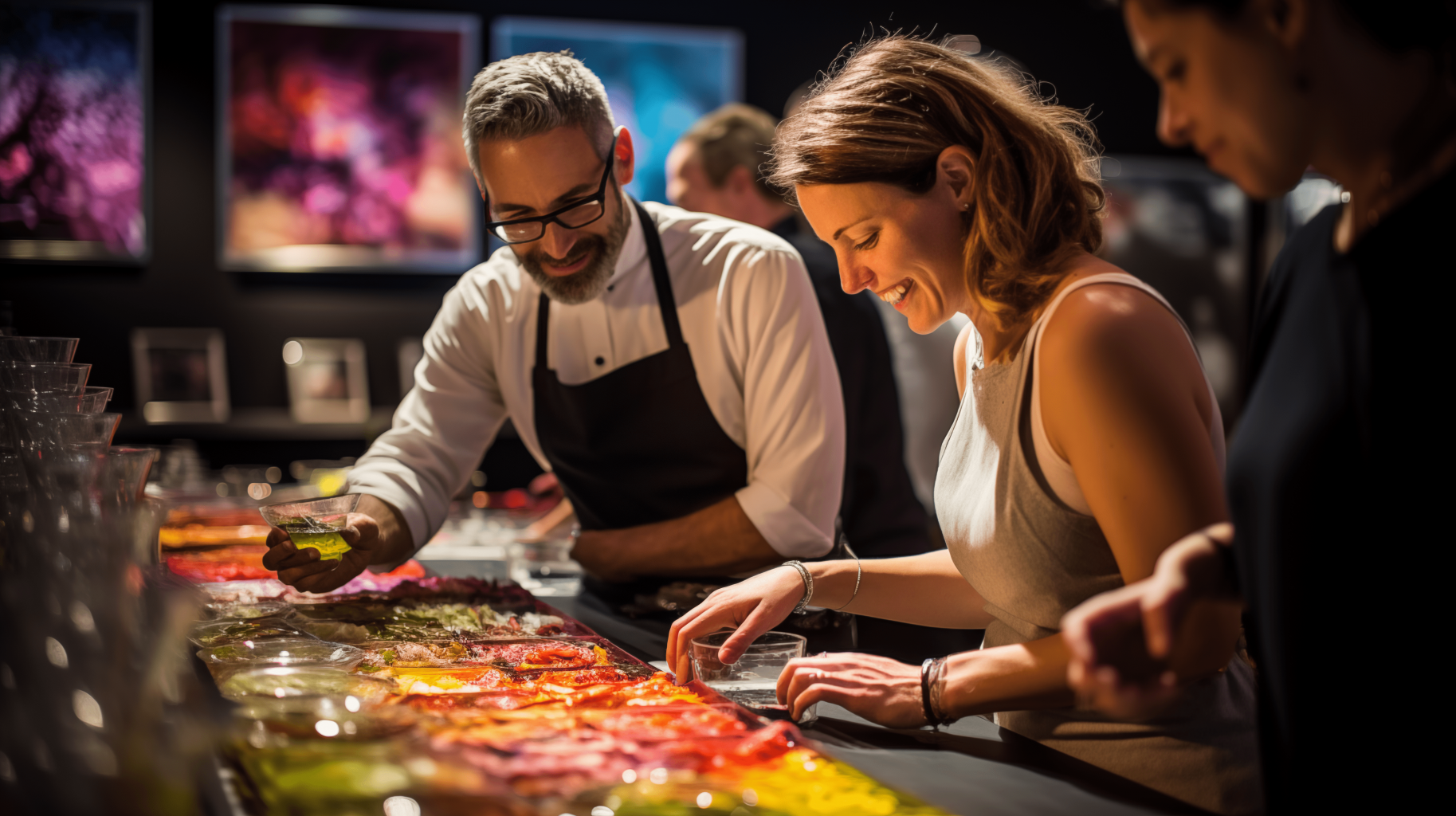
2B. Microbe Swap Meets : Microbe Swap Meets are gatherings where enthusiasts exchange small microbial samples, fostering collaboration in experimenting with new flavors. Participants include microbial enthusiasts, DIY fermenters, and those building diverse microbial collections.
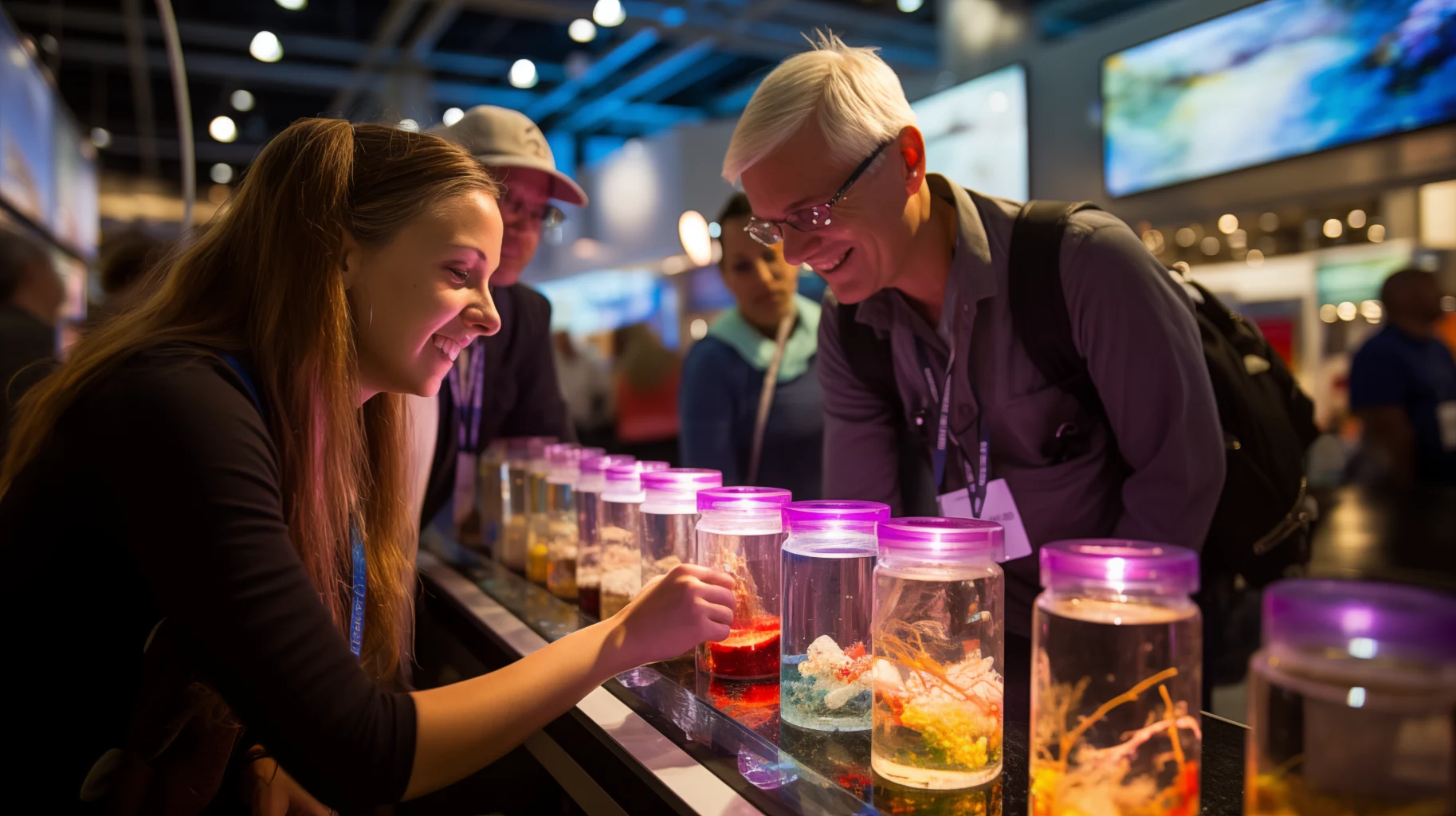
2C. Fermentation workshops : Fermentation Workshops are hands-on sessions led by experienced community members, guiding newcomers in the art and science of microbial fermentation. Participants include individuals eager to learn about microbial cultivation and fermentation processes.
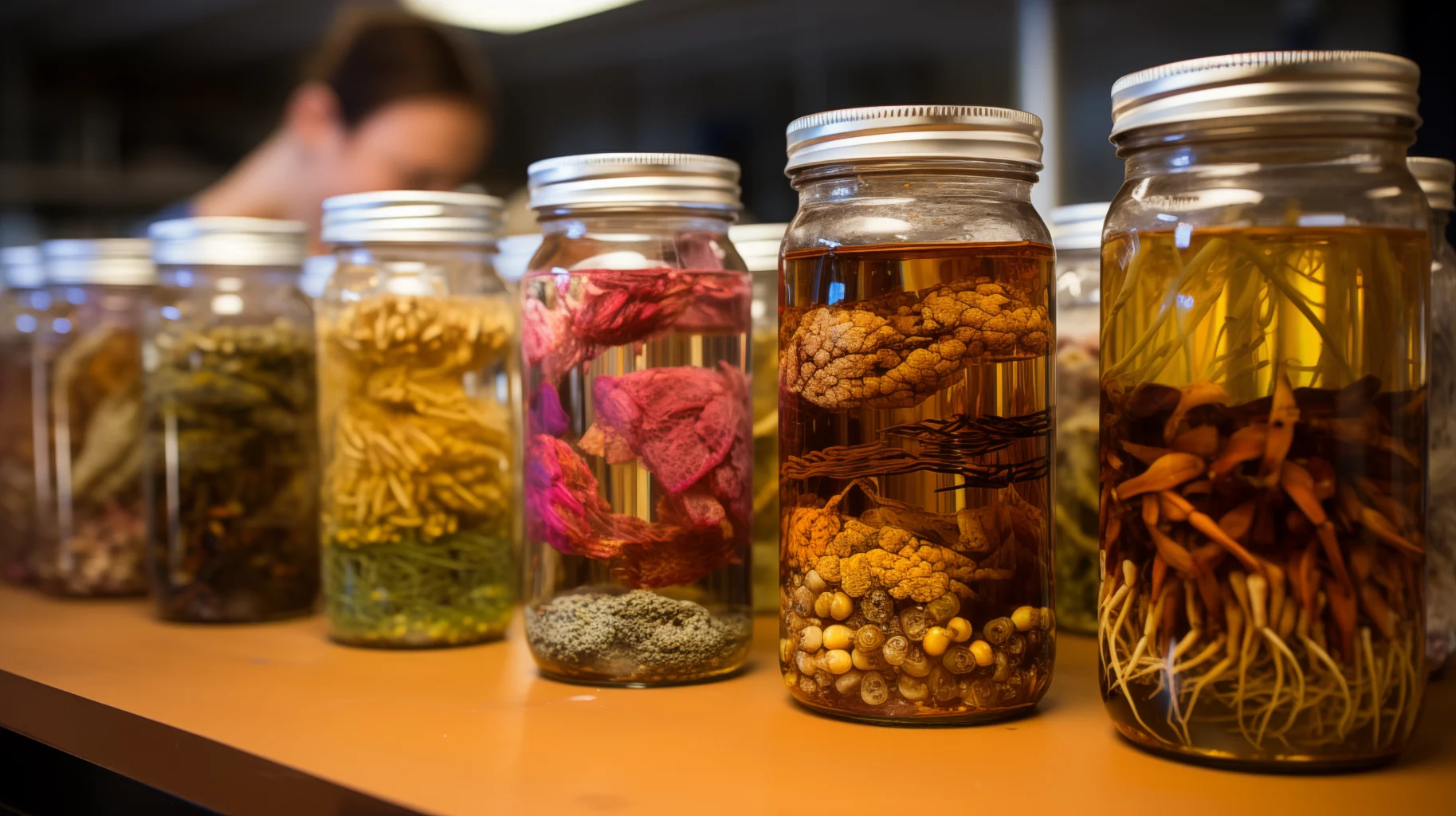
3B. Experimental restaurants
The Experimental Restaurants in the Microbial Renaissance are avant-garde culinary hubs where diners experience a sensorially rich affair. Visually stunning dishes crafted from precision-engineered microbial ingredients take center stage, captivating the eyes. Soft ambient music complements lively discussions, fostering an atmosphere of culinary curiosity. Diners embark on a tactile journey, exploring a spectrum of textures heightened by the innovative use of 3D-printed meals. Global fusion dishes celebrate the diversity of microbial-based ingredients, offering a taste of sustainable and inventive gastronomy. Chefs showcase their culinary artistry, creating a multi-sensory experience that seamlessly integrates tradition and cutting-edge gastronomy on each plate.
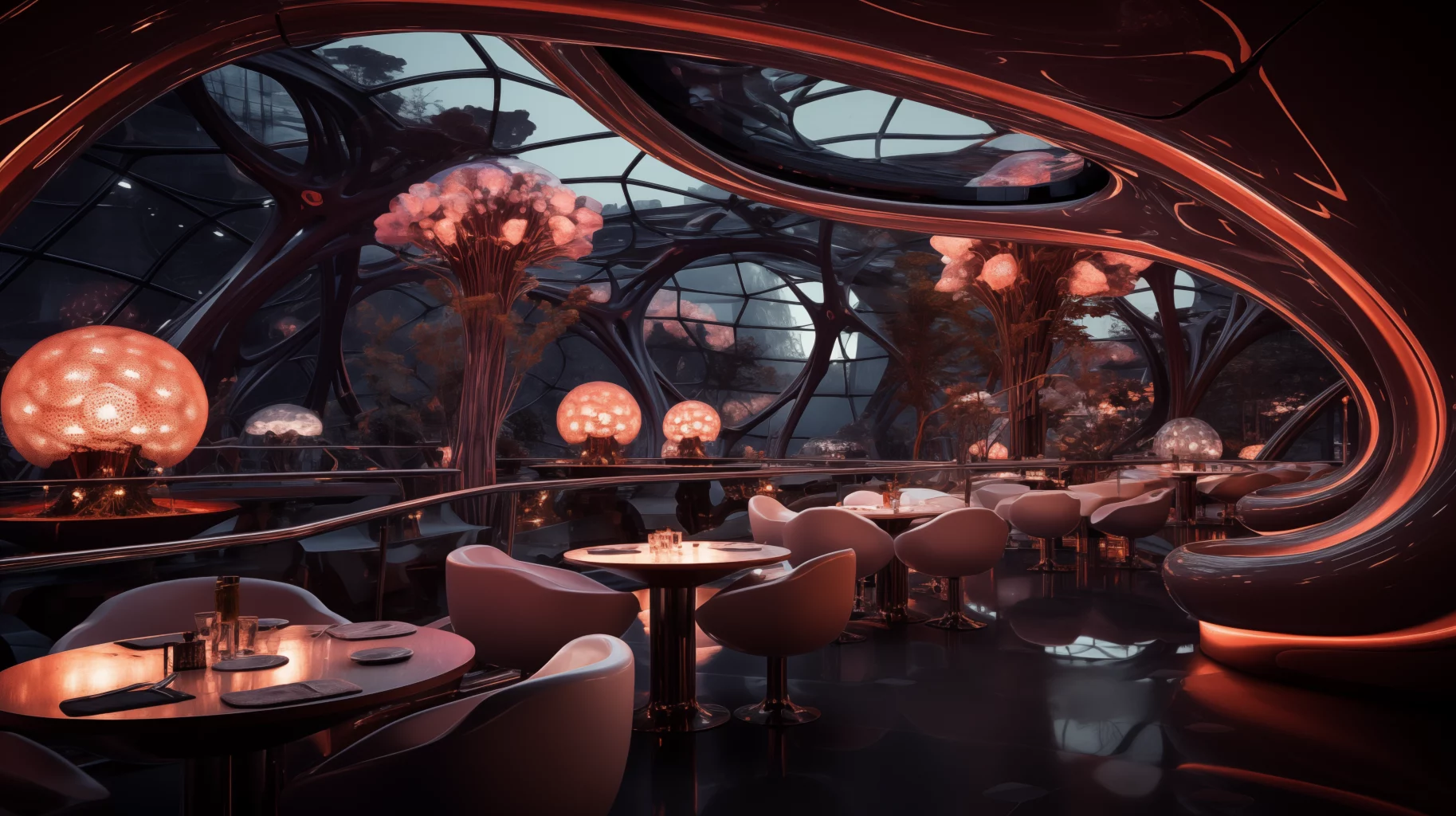
4B. Microbe Spectrum Scanner
The Microbe Spectrum Scanner is a compact, handheld, or slightly larger stationary device designed for analyzing and providing information about the microbial composition of various foods and surfaces. Equipped with advanced spectroscopy and genetic analysis technologies, it identifies and quantifies specific microbial strains present in a given sample. Users can quickly gain insights into the microbial diversity of their surroundings. The device features a touchscreen interface with intuitive controls and a small, detachable compartment for sample analysis. The MSS enhances awareness of the microbial world, offering a real-time, augmented reality view of microbial cultures, contributing to a deeper understanding of microbial dynamics and their role in various environments.
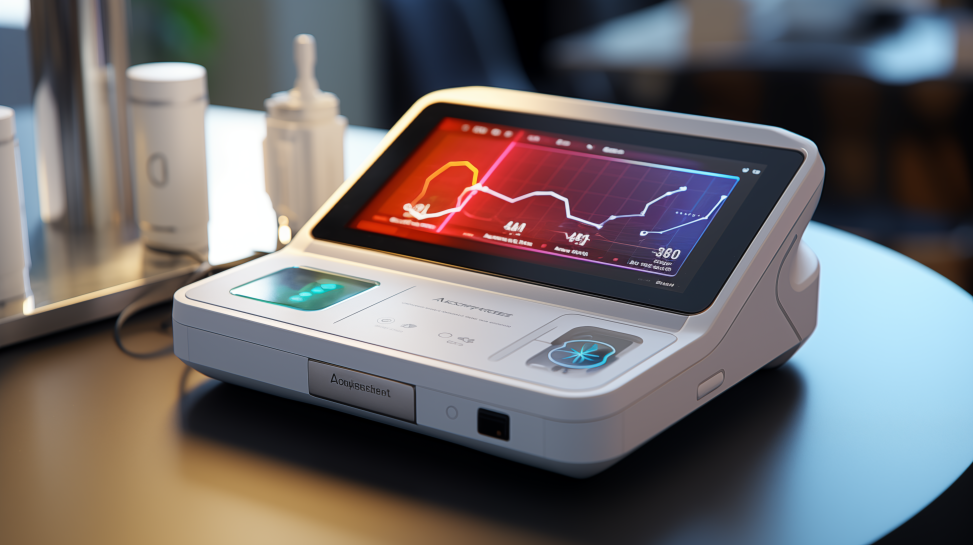
Personas
The Enthusiast Explorer – Becky (26)
A young urbanite deeply intrigued by the microbial renaissance. Becky actively participates in microbial celebrations, tasting events, fermentation workshops and regularly visites experimental microbe restaurants. She enjoys cultivating personalized microbes at home with help of the Microbial Synthesizer and experiments with novel microbial-based recipes. Becky embraces the diverse and sustainable culinary experiences offered by microbial foods, eagerly sharing discoveries and contributing to the communal spirit of sustainable living.
Personas
The Skeptical Observer – Johan (71)
An older individual resistant to rapid dietary changes, skeptical about the benefits of microbial-based foods. Johan sometimes eats at transitionary microbial cafés but does not want to take part in any of the Microbial Celebration activities. He is not interested in tasting the latest culinary microbial inventions or cultivating microbes at home. Johan requires persuasion through wonder and campaigns to gradually shift perception, leaning toward acceptance as the benefits of microbial-based foods become more evident.
